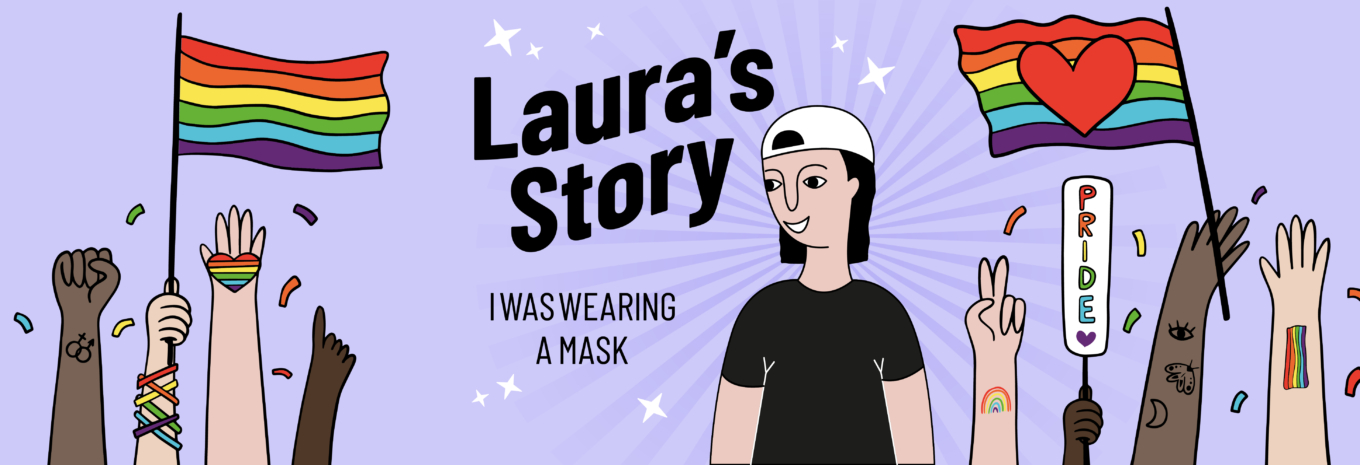While I was growing up, same-sex couples couldn’t get married or have children and the promotion of homosexuality was forbidden. It was a very difficult journey to be a part of, and I had a very unhappy and confusing childhood full of questions, secrets and lies.
I thought that liking girls was wrong and that it would ruin my entire life. I thought that if anyone knew, then I’d be bullied by the kids at school and my parents would be disappointed in me, and I couldn’t bear that. Growing up is hard anyway, throw in being a lesbian and it’s like a whole other level.
So, I tried to be someone I wasn’t right into my 20’s and every relationship I was in was kept a secret. I tried to act confident and thick-skinned so that people wouldn’t say mean things to me but in reality, I was wearing a mask to hide the fact I was really sad for a long time.
“My world was full of secrets and silent shame until one day, I met my wife and everything changed.”
We’ve been together nearly ten years now and while we were dating, she just looked at me and said, ‘Oh I told my parents we’re together’ and that’s how I knew she was the one. She said it with such confidence – I felt like I could finally accept myself, take off the mask and be happy.
But there are still times when I feel uncomfortable. Whether it’s someone shouting homophobic slurs at my wife and I for holding hands, a shop assistant assuming that we will pay separately because surely we’re just friends, or people at the park wondering what our children call us – we all face many different challenges, and these are just a few of ours.
It’s important that we support one another and stand strong with our LGBTQ+ communities across the globe because in some countries, it’s not even legal for people to have the family that I do. We need pride, we need acceptance, and we need solidarity.
What non-LGBTQ+ people can do
- Have open, honest conversations
- Don’t say things like ‘my cousin is a lesbian, so maybe you know her’
- Don’t ask me personal questions without getting to know me first
- Talk to your kids about having boyfriends and girlfriends – let them know that either, neither or both is okay
- Do what you can to ensure your colleagues, friends and family can confide in you.
I truly believe that my younger years would have been far better if I was growing up now, in a space where LGBTQ+ communities are more widely accepted and openly discussed. If I saw more LGBTQ+ people in the workplace, in communities and in media then maybe I would have felt more empowered to be myself sooner – seeing parts of yourself reflected in other people’s lives can only be a good thing.
Being LGBTQ+ in the workplace
Being a lesbian in the workplace has sometimes been tough for me. When I worked for my previous employer, I invited a colleague to my wedding, and he said he couldn’t possibly watch two women get married. When I told management, he continued to work there and that’s one of the reasons I decided to leave.
These things have a long-lasting impact. Not only did it make me uncomfortable, but it made me question whether to be so open again in the future.
Being LGBTQ+ at Alive
When I joined Alive, I was nervous because of the experiences I’d had at my previous workplace. But I soon realised that no one at Alive cares I’m a lesbian – I can just be myself and share stories about my family without feeling like we’re on a different level somehow. I couldn’t have gone through the adoption process without my Alive family, and they have been so supportive throughout our journey.
That’s why having diversity and inclusion in the workplace is so important – colleagues have the potential to become your second family, the people you can lean on every day, and that’s exactly what happened for me when I joined Alive.
Read our stories …
















